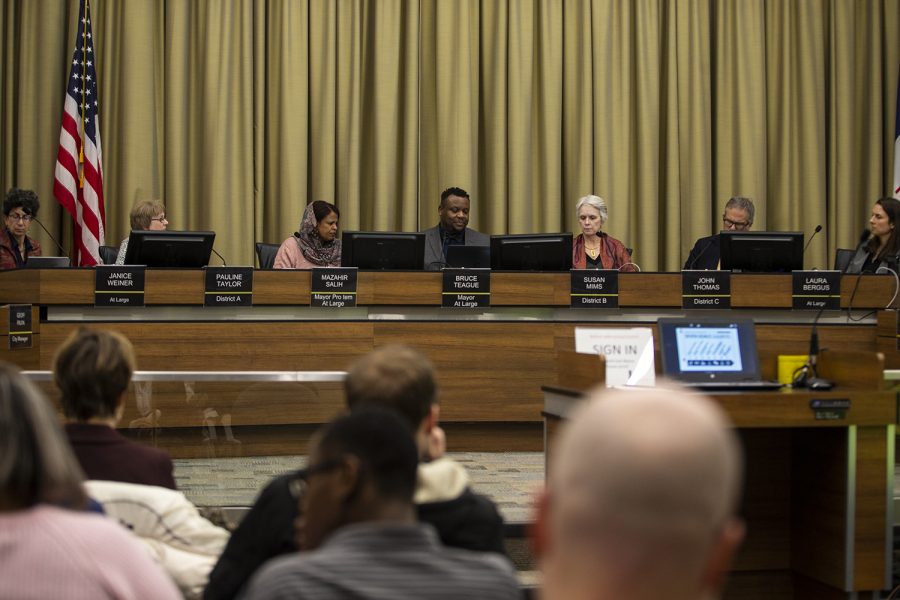City Council holds off on taser purchase amid protests against police funding
After deferring this decision from the Aug. 18 meeting, the Iowa City City Council moved to defer the purchase of new tasers for the Iowa City Police Department indefinitely, awaiting a report on military-grade equipment in the department and seeking to explore other constraint options.
Nichole Harris/The Daily Iowan
The Iowa City City Council is seen at an Iowa City City Council meeting on Tuesday, Feb. 18, 2020. (Nichole Harris/The Daily Iowan
September 2, 2020
The purchase of new tasers for the Iowa City Police Department, deferred at the last Iowa City City Council meeting, was deferred indefinitely as the council awaits an inventory of ICPD military-grade equipment, with community members calling the potential purchase of tasers as a show of “bad faith” after the council had committed to restructure the police department.
The city council voted 7-0 on Tuesday night to defer the purchase indefinitely and seek other options for remote constraints.
This is the second time the city council deferred voting on purchasing new tasers. The city council requested that they see the ICPD’s military-grade equipment before making a decision on Aug. 18.
The purchase would cost $230,000 over five years, coming from the police budget that was allocated in the 2021 city budget passed in March.
Leaders from the Iowa Freedom Riders, a group leading protests for racial justice and change within the Iowa City community, and other Iowa City protesters spoke at the meeting to advocate against purchasing 69 new tasers to replace the ICPD’s outdated tasers.
Iowa Freedom Rider member Liana Suleiman said the recent purchase was added after the city council had approved the resolution on June 16 in response to the Iowa Freedom Riders’ demands, including active efforts to restructure the police department.
Suleiman said whether or not the city council were to move forward with replacing the tasers was ‘irrelevant’ until discourse has begun on how restructuring the police is to take place.
“You made a commitment to talk about and have discourse regarding how to restructure the police department,” she said, “…and within that matter of this discourse, you keep pushing that further and further down the line, and in the interim, you say you are willing to allocate the people’s taxes to fund the police department. When we made a commitment to work on restructuring, that is absolutely unacceptable.”
Iowa City resident and UI PhD student David Drustrup said for city councilors to say Black Lives Matter without action is meaningless. He referenced the guest pieces to media outlets written by City Councilors Janice Weiner and Laura Bergus, who stated their approval for protesting but disapproval for spray painting buildings.
“At the end of the day, we need to decide whether we want to upgrade the weapons used against us, or upgrade things that will protect us from needing the police,” he said.
Drustrup added that research has shown that while tasers can lead to less use of higher force weapons, the weapons are used disproportionately against people of color, specifically young people of color.
Iowa Freedom Riders organizer Raneem Hamad said she feels that the delay responding to the group’s police demands has been purposeful.
“It’s frankly disheartening to see that as [the city] council continues to claim that they are trying to commit to the Black Lives Matter movement in the press,” she said, “…that they are consistently backtracking in terms of the action that they’re taking physically.”
City Manager Geoff Fruin recommended to the city council to defer the vote on purchasing tasers indefinitely as opposed to their next meeting to give him time to collect more information.
City Councilor John Thomas said he recommended the city council look into alternative methods of remote constraint less invasive than tasers, citing a tool used by the Minneapolis Police Department called a bola wrap, which subdues the individual without being reliant on pain.
Johnson County Supervisor Royceann Porter expressed support for the Iowa Freedom Riders’ police demands and said newer tasers are not guaranteed to be as effective as perceived.
She said tasers are ineffective up to 40 percent of the time, and in three large departments in major cities, newer models were less effective than older ones. In 258 cases over three years, a taser failed to subdue someone who was then shot and killed by police.
“Having this piece come up on city council right now, during a time when our black people are being killed by police, not one time are police pulling out tasers to see if they fail or not fail,” Porter said. “It’s just straight ‘go for the guns’…I’m speaking on behalf of my black people because not only do we not want to get shot, but we do not want to get tasered either.”




